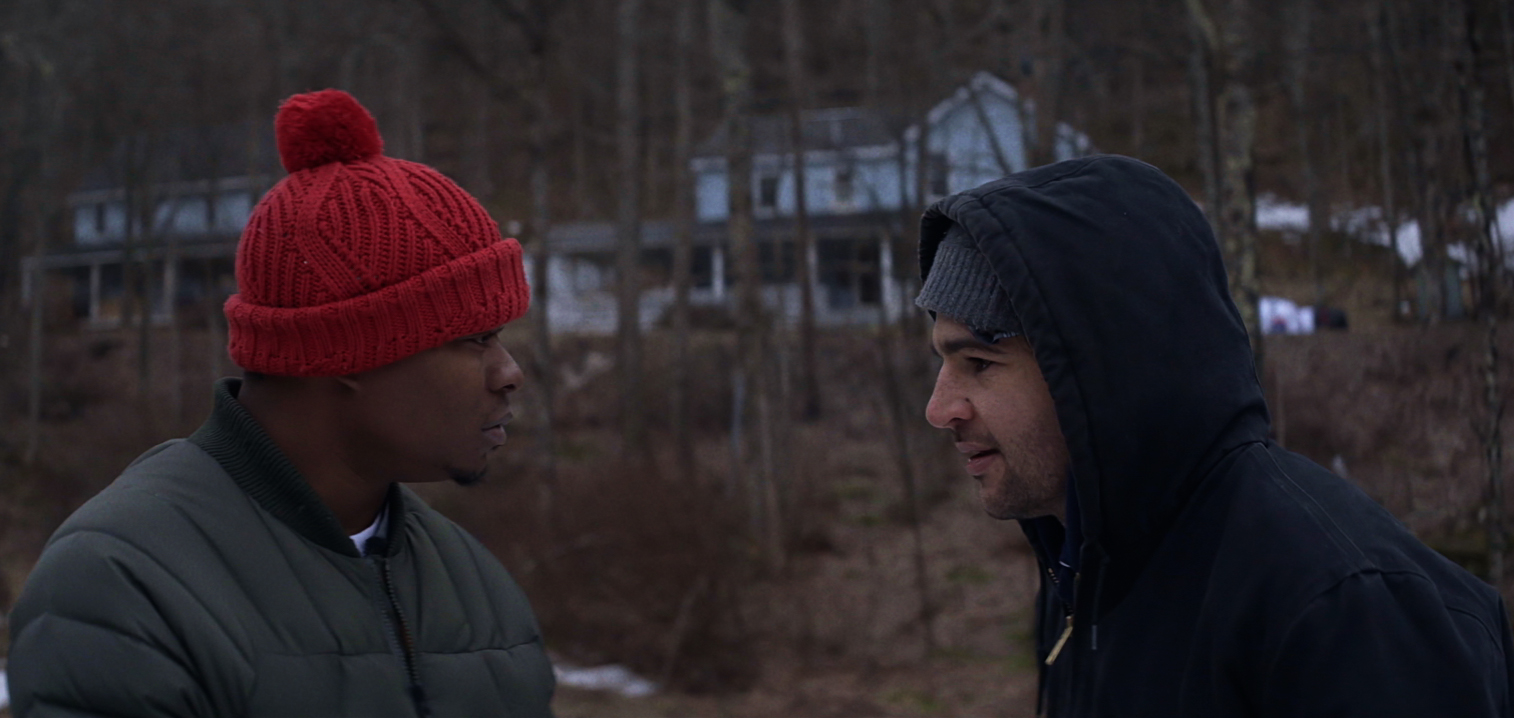

Jason Mitchell and Christopher Abbott in Tyrel, a Magnolia Pictures release. (Photo courtesy of Magnolia Pictures)
In Sebastián Silva’s new film Tyrel, the sense of alienation is palpable, but not as successful as it could be. In an age when narratives like Get Out and Sorry to Bother You have highlighted the experience of Black identities against a hostile white mainstream, this movie is a boisterous “boys will be boys” story at best, and a naive, meandering, tip-toeing examination of race relations at worst.
The main character Tyrel, which we later know is actually “Tyler” as voiced by the main character himself (Jason Mitchell), is invited by his friend Johnny (Christopher Abbot) to join him for a weekend in the Catskills to celebrate the birthday of an old friend. The fraternal love between Tyler and Johnny is obvious. In the opening moments of the film, the two push a car uphill in the middle of winter while chatting about a range of mundane and meaningful topics from Tyler’s life. Here is our last chance to see Tyler as his true self, before discomfort, awkwardness, and loneliness take over.
What motivates the radical change in our protagonist? More and more white men join the party in the country house where they are to spend the weekend. Tyler goes from a timid yet charming man to a diffident and self-conscious person, trying to appease the crowd while attempting to stay out of the epicenter of the group. But he fails.
Tyler reluctantly agrees to play games but quickly regrets the decision when he is pressured into imitating a Southern Louisiana accent (the “Black accent”) by his fellow partiers. Once that happens, Tyler rethinks his place in the group and opts out of the binge drinking that follows. He even sneaks into another room and pretends to fall asleep.
For a while we think Tyler has put his insecurities aside when the eccentric and wild Alan (Michael Cera) arrives in a rabbit fur coat. In Alan, Tyler sees a reflection of himself. Alan is seen as different by the members of the group, partly because he’s such of a weirdo, mainly because he seems to be more well-off monetarily speaking. In Alan’s presence, Tyler lets loose and starts to feel at ease, but that’s short-lived.
He starts drinking too much and behaving like any drunk person would—getting physical to the point of getting a tad carried away. He starts to internalize how others might look at him, oh, hey, here’s the violent Black guy. This is the breaking point. He steps aside, feeling completely out of place, with nobody to genuinely relate to. Why is he here? Still under the influence, he turns overly apologetic and erratic to the point of wanting to leave the cabin at any cost.
Having said all that, this examination of a Black man feeling like an outcast is very superficial, with no real introspection throughout the film. The audience is misled a few times with lines of dialogue that hint betrayal and looming danger, but they only tease. Silva sets the ground for crucial themes (the backdrop is the year Trump is President) but misses in further developing and executing the significance of having Tyler in this party among an all-white male ensemble. In an interview, Silva opens up about the inspiration behind the film: during a trip to Cuba, he saw a group of young men drinking and having a good time, except for one who was visibly uncomfortable: he happened to be the only Black one.
In viewing the film, it’s evident that the director’s scope is most successful in showcasing the group of young and middle-aged white men acting foolish while drunk, a collective with no actual concern and with seemingly zero personal issues. They live for fun and act on it, as during their frequent (and sometimes embarrassing) R.E.M. singalongs.
Which begs the question: can a Latin American director make an effective film about an alienated Black man? I don’t know, but not here. Despite a few genuine moments, the film does not fully inhabit Tyler’s dilemma. By the end, we are left with too many questions unanswered: what has this trip meant for Tyler? How important is his friendship with Johnny, and why did Tyler agree to come on the trip in the first place? We’re not sure—and the film doesn’t seem very sure either.
Tyrel is out in theaters starting December 5.
***
Luis Luna is Latino Rebels’ arts writer. He tweets from @luarmanyc.


